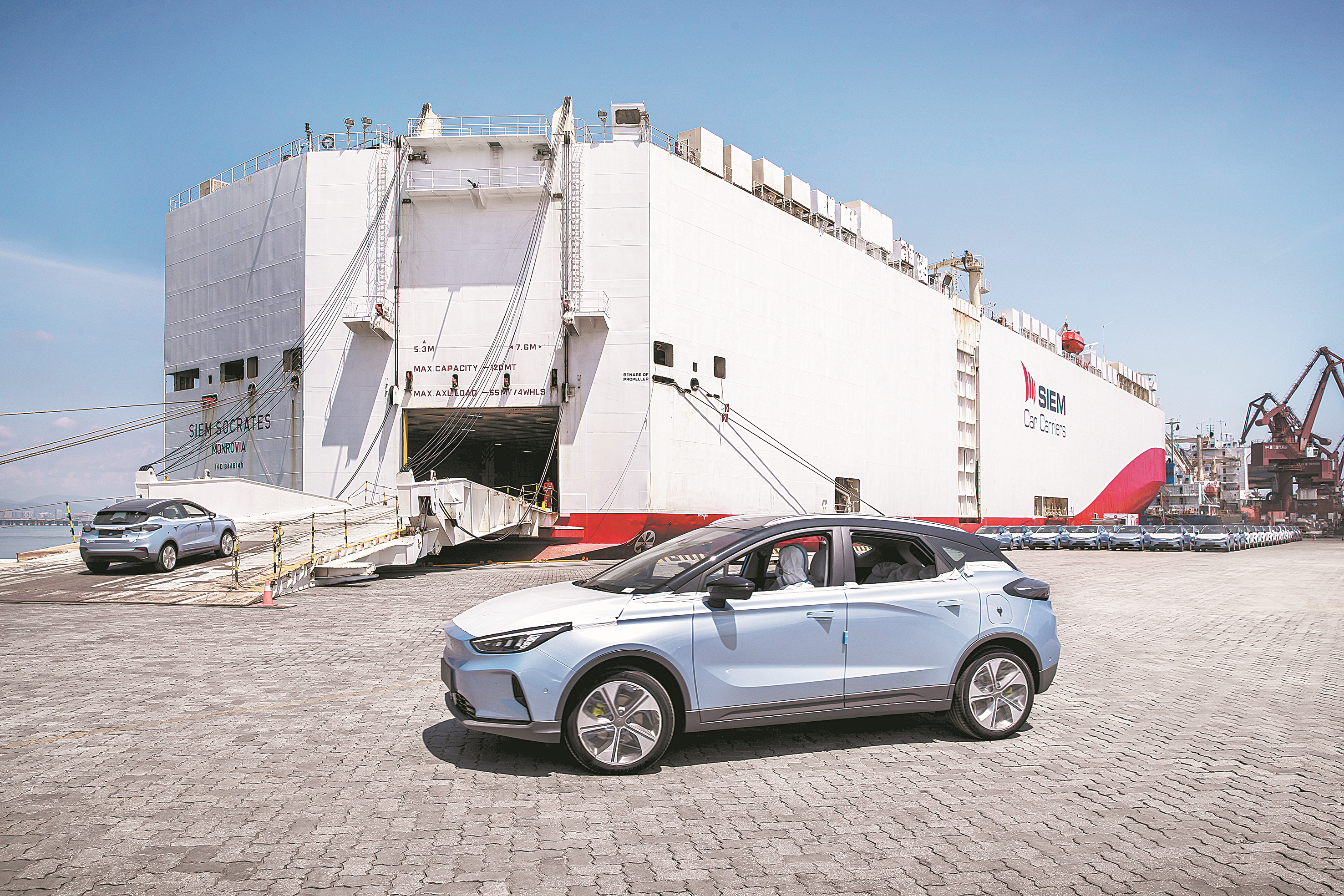
The photo shows the first batch of Geely Geometry C electric vehicle exported to overseas markets. (COURTESY PHOTO)
By?Staff?Reporters
Wolfgang Lange and his family, living in Berlin, bought a China-made electric vehicle in 2019. Since their purchase, they have been more than satisfied with the car.
Not only is it the Langes who are buying China -made vehicles, but they are becoming an option for more global consumers. In 2022, China surpassed Germany to become the second largest vehicle exporter, most notably of its new energy vehicles (NEVs).
Technological innovation
So why is it that people outside the country are buying Chinese cars? They are affordable and energy-saving, Lange told Science and Technology Daily, pointing out that the power generated from the solar panels on his house are enough to charge the car.
A lower price is not the key to the overseas market, on the contrary, it usually conveys poorer quality from the perspective of consumers. It is advanced technology that drives the long -term growth of overseas sales, said an overseas market manager from Geely Automobile Group. Applying one of the most efficient modular building platforms in China, Geely has exported over 450,000 cars and led the world in terms of NEVs exports last year.
Another vehicle giant, Chery, has employed more than 10,000 engineers and scientists from various fields, such as styling design, automatic driving, chip, software, operating system and smart cockpit, including the former top designers of Mercedes-Benz.
As pioneers of electric vehicle R&D, the BYD brand has been committed to NEVs technology for more than 20 years, and handled core technologies along the entire industrial chain such as battery, engine and control system, said Luo Hao, BYD brand and PR assistant manager.
China's automobile enterprises are striving for technological innovation to produce high-quality and reliable products, said Ye Shengji, chief engineer from the China Association of Automobile Manufacturers (CAAM), noting that the country's automobile sector is embracing the emerging technologies including electrification, intellectualization and network of automobiles.
Resilient supply chain
At the users center of NIO in Berlin, visitors are amazed by the electric sportscar on display, and show great interest in this luxurious NEV brand from China.
"In the field of NEVs, China has established a technical standard system, formed a complete and controllable industrial system, and significantly improved its innovation capability," said Zhu Yifang, from China Automotive Strategy and Policy Research Center.
A report by CleanTechnica shows that 10 Chinese auto companies are listed on the global top 20 bestselling NEV brands, and contributed nearly 40 percent of the annual global total sales in 2022. According to CAAM, Chinese automobile exports exceeded three million units in 2022, up 54.4 percent year-on-year.
Such a surge in overseas sales is distinguished amid the gloomy global automobile industry that was overshadowed by the COVID pandemic, geopolitical conflicts and uncertainties. The accelerating global march of China's indigenous brands, such as Chery, BYD and Geely, is supported by a robust automotive industrial and supply chain, which is more resilient and less impacted by external factors, said Ye.
Zhu noted that since 2020, the global auto market has been hit hard due to the pandemic. China took timely and effective pandemic prevention and control measures to promote the domestic automobile industry and market recovery before reaching out to the global market, laying a good foundation for the substantial growth of China's automobile exports.
Win-win cooperation
The globalization of China's automobile industry brings not only a growing market share, but also the collaboration in technology and supply chains, as well as cultural exchanges, said Yin Tongyue, chairman of Chery.
As Chinese automobile enterprises go global, they have been sharing opportunities with their local partners and become deeply integrated into the global auto industrial chain. Through localization, Chinese enterprises are contributing to the socio-economic development of those countries.
In March, at a new car launch event in Amman, Jordan, BYD announced a strategic cooperation plan with local car dealers. The two sides will cooperate in sales, after-sales service and maintenance to provide better service for Middle East consumers. While selling cars, BYD is also providing technology training to overseas dealers and partners, said Luo Hao.
Geely is committed to promoting localization in overseas markets in terms of product, supply chain, human resource and marketing. Taking supply chain as an example, Geely currently has several manufacturing factories around the world, and will further strengthen local manufacturing and local purchasing.
Chinese auto enterprises have carried out close cooperation with their European counterparts throughout the entire NEV industrial chain, said Jean Le Pavec, a former French diplomat to China, adding that they have built not only vehicle assembly factories, but also ancillary facilities such as charging piles, as well as production lines of power batteries.
The trio will conduct a series of experiments in fields such as life science, fluid physics, combustion science and materials science. Notably, this is the first time that fruit flies have been taken on a Chinese space mission as experimental subjects. What made scientists choose fruit flies? What experiment will they undergo?
